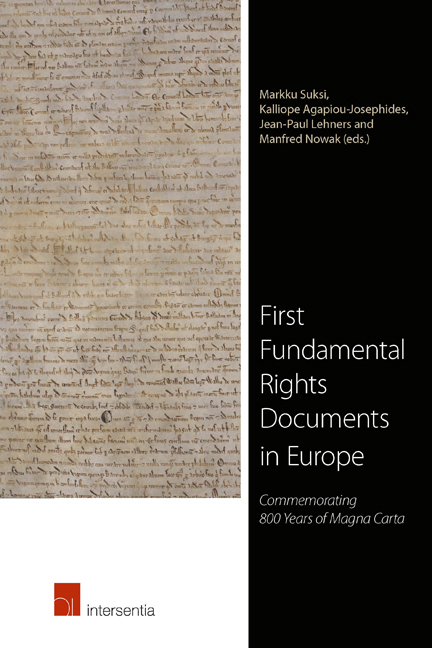Book contents
- Frontmatter
- Preface
- Contents
- List of Authors
- 1 Introduction
- PART I
- PART II
- 11 France: Foundational Importance of the Declaration of 1789
- 12 Sweden: Free Press as a First Fundamental Right
- 13 The Netherlands: The Batavian Staatsregeling as the First Fundamental Rights Document
- 14 Portugal: ‘Tropical Versailles’ in the Beginning of the Nineteenth Century
- 15 Luxembourg: Fundamental Rights in a Small State
- 16 Greece: Reflections from the Hellenic Legal Tradition
- 17 Denmark: In Love with Tradition
- 18 Germany: Fundamental Rights as an Instrument Towards the Rechtstaat
- 19 The Czech Republic: On the Road to Rights and Freedoms
- 20 Romania: The Birth of Fundamental Rights as a Form of Political Contention
- 21 Bulgaria: The Liberal Tarnovo Constitution
- 22 Finland: Rights to Facilitate Participation
- 23 Estonia: First Landmarks of Fundamental Rights
- 24 Slovakia: The Right of a Nation
- 25 Latvia: Second Part of the Constitution as a Project for Next Generations
- 26 The History of Fundamental Rights in Europe: A Long and Winding Road
- Index
16 - Greece: Reflections from the Hellenic Legal Tradition
from PART II
Published online by Cambridge University Press: 15 December 2017
- Frontmatter
- Preface
- Contents
- List of Authors
- 1 Introduction
- PART I
- PART II
- 11 France: Foundational Importance of the Declaration of 1789
- 12 Sweden: Free Press as a First Fundamental Right
- 13 The Netherlands: The Batavian Staatsregeling as the First Fundamental Rights Document
- 14 Portugal: ‘Tropical Versailles’ in the Beginning of the Nineteenth Century
- 15 Luxembourg: Fundamental Rights in a Small State
- 16 Greece: Reflections from the Hellenic Legal Tradition
- 17 Denmark: In Love with Tradition
- 18 Germany: Fundamental Rights as an Instrument Towards the Rechtstaat
- 19 The Czech Republic: On the Road to Rights and Freedoms
- 20 Romania: The Birth of Fundamental Rights as a Form of Political Contention
- 21 Bulgaria: The Liberal Tarnovo Constitution
- 22 Finland: Rights to Facilitate Participation
- 23 Estonia: First Landmarks of Fundamental Rights
- 24 Slovakia: The Right of a Nation
- 25 Latvia: Second Part of the Constitution as a Project for Next Generations
- 26 The History of Fundamental Rights in Europe: A Long and Winding Road
- Index
Summary
INTRODUCTION
The identification, description and analysis of documents of similar importance to Magna Carta, for a country like Greece, with a legal culture that transcends the actual creation of the Greek Modern State (1832), is certainly not an easy exercise. This is due to the fact that from the era of the Greek City-State (Polis) of antiquity to modern times and the post-1945 human rights period, important documents and references of the Hellenic legal tradition related, directly or indirectly, to the recognition of fundamental rights and democratic institutions and the rule of law in a legal order of principles and values. An interesting feature of the historic process from Greek City-State to contemporary Greece is that it culminated with the adoption of important texts of constitutional character and value, addressing the concerns of the citizen, the human person and his rights.
It is true that the legal assessment and political significance of such texts should take into account that they were formulated in different historic periods and within different societal and political contexts. They have autonomous characteristics, especially in the field of fundamental rights. From the philosophical streams and perspectives of Ancient Greece, to the codifications of legal provisions up to the period of the Enlightenment and beyond, including the War of Independence/Revolution of 1821, the emergence of Greece as a State and its transformation during the nineteenth century from Kingdom to Republic, the very notion of fundamental rights does not seem to have had an identical perception and recognition in the evolution of the society and space called Greece. Analysis reveals, however, important insights into such legal tradition, because it highlights the principles and values that underlie the organization of Greek societies where fundamental rights seem to be prima facie absent. And even if, in the Poleis/Cities in the golden period of Athenian democracy and beyond, these fundamental rights and the modern version of civil rights do not necessarily find an absolute match, whether because of the institution of slavery (and its corollary ‘eleutheroi’) or because of the unequal position of women, the antithesis is interesting.
- Type
- Chapter
- Information
- First Fundamental Rights Documents in EuropeCommemorating 800 Years of Magna Carta, pp. 197 - 208Publisher: IntersentiaPrint publication year: 2015

